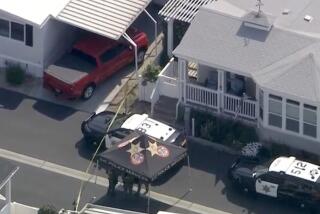Deputy’s job a focus in slaying
- Share via
A Los Angeles County sheriff’s deputy gunned down Saturday outside his boyhood home in Cypress Park had been assigned to guard the most dangerous inmates in the county, including members of the notorious Mexican Mafia gang, authorities said Sunday.
Los Angeles police and sheriff’s officials said the prospect that Deputy Juan Abel Escalante was killed because of his work at the jail remained one of three possible motives. Investigators were also considering the possibility that neighborhood gang violence or a personal grudge were behind the killing.
“As of right now, all of those possibilities are on the table,” said Los Angeles Police Department Deputy Chief Sergio Diaz.
Escalante, 27, was shot to death outside his parents’ home about 5:40 a.m. Saturday as he left for work at the downtown Men’s Central Jail. He was assigned to the “high power” unit, where dangerous inmates -- many of them violent gang members -- are housed in single-man cells, Diaz and Sheriff Lee Baca said.
Detectives from LAPD’s robbery-homicide division were investigating the killing with the assistance of detectives from the sheriff’s homicide division and the jail’s gang unit. Baca said Escalante’s assignment put him in touch with members of the Mexican Mafia, a gang known to direct street crime and violence from behind prison walls.
“Until we can verify anything, it has to be looked at. In a homicide of this kind, with a person who’s from a neighborhood that’s had some difficulty with gangs, you can’t rule anything out, particularly that,” Baca said.
Witnesses said they saw a white, four-door car approach Escalante shortly before gunfire erupted. The deputy, his wife and their three children were living with his parents while preparing to purchase a home in Pomona.
At Men’s Central Jail on Sunday, deputies wore black bands across their badges and dress uniforms with black ties in remembrance of their fallen colleague.
“They’re not taking it well,” said Sheriff’s Sgt. Ron Bottomley, who supervised Escalante for the last year. “It’s a very sober situation. We’re a family. He had two families. He was a great family man, and he had a family here. Just like his family is grieving him, so are we.”
A small memorial for Escalante was set up near his parents’ home at the corner of Thorpe and Aragon avenues.
Bouquets of flowers surrounded about a dozen candles that were arranged in the shape of a cross. White roses and blue carnations were left with a simple note: “In memory of Deputy Escalante.”
Cypress Park, a blue-collar neighborhood northeast of downtown, has had a history of gang warfare. Earlier this year, a shooting outside an elementary school near Escalante’s home touched off a fierce gun battle between gang members and police in nearby Glassell Park.
Escalante had been considered a local success story because he grew up in a neighborhood plagued by gang violence and had pursued a career in law enforcement.
“He was this close to moving out of that neighborhood,” said Bottomley, moving his thumb and index finger millimeters apart, “and getting into, for him, his dream home. It would be his first home. We’re talking weeks away. He was so happy everything was going well. . . . Now are they going to have that dream home? In a matter of seconds, everything was taken away from him.”
Many of the 800 employees at Men’s Central Jail have been touched by Escalante’s death.
“He was the cream of the crop, and that’s what really hurts,” Bottomley said, his eyes red and tearing up. “You’ve got three kids that are going to have to grow up without a dad.
“He was close to everybody. He was one of those outstanding guys that there wasn’t a person in the jail that [could] say anything bad about him. He was a good, fair man, an outstanding deputy. He was fair with the inmates but firm. If I gave him orders to do something, he was saying, ‘Yes, sir’ before I could finish it.”
Escalante, an Army reservist, was a 2 1/2 -year department veteran. Most deputies for their first assignments work in county jails for several years before they are transferred to patrol duties.
“We always try to be prepared for everything, but one thing we cannot be prepared for is when you lose somebody,” Bottomley said. “And through all of it, you have to stay professional and do your job. But you know, we’re all human. In some aspects we have to be more than human. . . . You still have to come in the next day and do your job, and a part of you has been torn away.”
One sheriff’s deputy, who asked not to be identified because he had not been given authorization to speak to the media, said guards at Los Angeles County jails often confront fear that inmates may try to harm them outside jail walls.
“You never talk about your family, where you live, your hobbies,” the deputy said. “Most guys don’t wear wedding rings. You don’t want to give the bad guys ammo to be able to say, ‘I know the name of your wife, your children.’ ”
It wouldn’t be difficult for gang members or former inmates to follow deputies home from Men’s Central Jail, the deputy said.
“They know where you work. They could just post up on the driveway and wait for you to leave,” he said.
--
tami.abdollah@latimes.com
Times staff writers Ari Bloomekatz and Andrew Blankstein contributed to this report.
More to Read
Sign up for Essential California
The most important California stories and recommendations in your inbox every morning.
You may occasionally receive promotional content from the Los Angeles Times.











